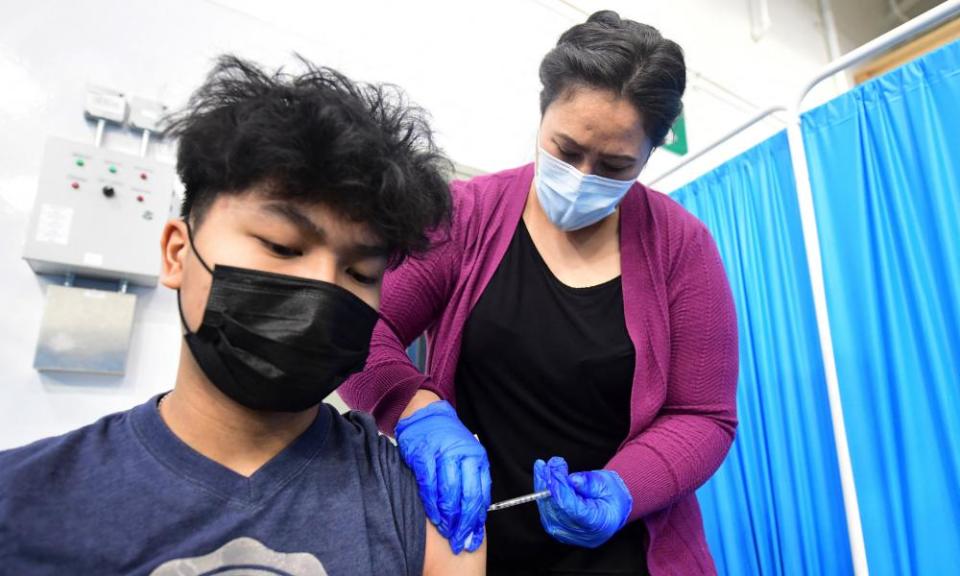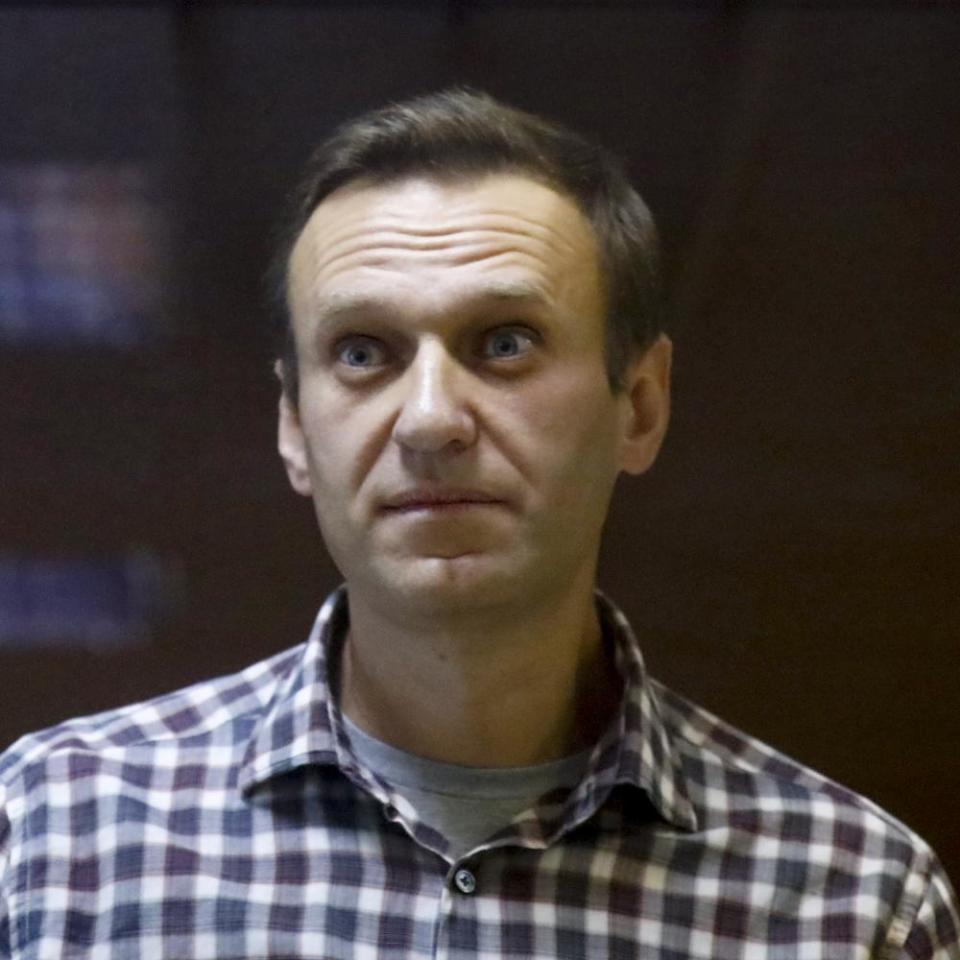First Thing: ex-police officer convicted of George Floyd’s murder
Good morning.
A jury swiftly and unanimously convicted former Minneapolis police officer Derek Chauvin of the murder of George Floyd yesterday, as the world watched on. Chauvin kept his knee on Floyd’s neck for more than nine minutes during an arrest, despite pleas from Floyd that he could not breathe and calls from passersby to stop. The case triggered waves of demonstrations against police brutality and racism in the US and around the world.
As the verdict was announced, cheers erupted in a crowd of several hundred outside the courthouse. You can look back on key moments in the trial here, and read more about the life of “gentle giant” George Floyd, the human behind the headlines.
‘My brother got justice’: Those were the words of LaTonya Floyd, sister of George, who was watching with other members of the family in Houston, Texas. “When I watch this man get handcuffed in court behind his back, just like he did my brother, he is not in control any more,” she said. “He has no power. But my brother do.”
Will this trigger real change? The verdict was a landmark moment for the US criminal justice system, but doesn’t address many other aspects of systematic racism, writes Oliver Laughland in his analysis. Prof Kellie Carter Jackson says “a prison sentence will not protect Black people from the violence of the police”, while the Minnesota attorney general, Keith Ellison, told a press conference that the verdict couldn’t be called justice, but that accountability was the first step.
Joe Biden, along with the first lady and vice-president, called the Floyd family shortly after the verdict. In an address to the nation on yesterday evening, the president called the conviction “a start”, but said more needed to be done “to deliver real change and reform”. This was echoed by prominent Black Americans including Bernice King and Barack Obama, who said that “true justice requires much more”.
And to some, it appeared they were proved right almost immediately, as news broke that Ohio police shot a Black teenage girl dead yesterday afternoon. Hazel Bryant, identifying herself as the girl’s aunt, said 15-year-old Makiyah Bryant had got into a conflict at her foster home and had a knife, but claimed she had dropped it before being shot multiple times by police.
There has been an outpouring of gratitude for Darnella Frazier, the teenager who filmed Floyd’s death. The video galvanised the protest movement worldwide and provided a key piece of evidence in the trial.
So what’s next for the George Floyd case? Yesterday’s verdict doesn’t mark the end of the case over Floyd’s death; three other officers face trial this year accused of aiding and abetting murder and manslaughter.
Biden will meet China’s president for the first time in office, at a crucial climate summit

China’s president will attend the US-led climate summit on Thursday after being invited by Joe Biden – the first meeting of the two leaders since Biden took office. China and the US are the world’s two biggest greenhouse gas emitters, but Xi Jinping is set to deliver an “important” speech.
Forty world leaders have been invited to the two-day virtual gathering, which starts on Earth Day tomorrow. The summit marks a major test for the US’s attempts become a world leader in the fight against climate change, as it tries to claw back credibility on environmental issues after years of Trump at the helm.
A Hong Kong woman has been conned out of $32m by fraudsters posing as Chinese officials. The scammers targeted an elderly woman living in a mansion in one of Hong Kong’s wealthiest neighbourhoods.
How are vaccines affecting coronavirus outbreaks around the world?

The first coronavirus vaccines were approved for emergency use nearly six months ago, but our analysis suggests they’ve not yet had a major impact on the global picture as a whole.
Due to shortages of supply, concerns over safety, public hesitancy and slow rollouts, most countries are still dependent on lockdowns to keep coronavirus under control. But the picture is highly varied; countries with high vaccination levels are in very different situations to poorer countries who have received far fewer vaccine doses so far.
Countries that have given 50 doses for every 100 people are reporting a decline in deaths, indicating a successful vaccine rollout does help reduce deaths.
But vaccines aren’t enough, and cases can still surge if social distancing measures are dropped. In Chile, deaths attributed to the Brazilian variant of coronavirus are still growing despite a thorough vaccination campaign.
All bar three of 76 poorer countries have very low rates of vaccinations, with just 10 doses administered for every 100 people.
You can read the full findings of the investigation, with interactions and graphs, here.
In other news …

The Kremlin is planning to crack down on supporters of the opposition leader Alexei Navalny in its most sweeping attack yet. Using secret evidence, a court in Moscow is to declare Navalny’s anti-corruption organisation as an extremist body, opening his staff and supporters up to fines and jail terms.
The planned football European Super League was in freefall last night after all six English clubs participating made a dramatic U-turn and said they would withdraw. It came came after fans, and the UK government, expressed outrage over the move.
Archeologists have located the lost home of Harriet Tubman, a leading abolitionist. Yesterday, federal and state officials announced that a cabin where she is thought to have spent time as a child, in Maryland’s Blackwater National Wildlife Refuge.
Stat of the day: US homelessness has risen for the fourth year in a row
According to figures from January 2020, released in a report last month, there are an estimated 580,000 people experiencing homelessness in the US, marking the fourth straight year that homelessness has increased. This marked the first year that the number of homeless people with children had increased, but people of colour remained hugely overrepresented.
Homeless individuals are disproportionately affected by the climate crisis, lacking shelter when climate-related disasters hit. Andrew McCormick explores the relationship between the two crises.
Don’t miss this: how to be happy? Here are tips from Oprah’s life coach
Matha Beck is a life coach who regularly works with Oprah Winfrey. In this interview, she discusses leaving an abusive life in a Mormon community, why lockdown provided the ideal time for soul-searching, and how to connect with those you drifted from during lockdown.
Last thing: a rail worker in India saved a boy who fell on the tracks
When a six-year-old boy fell on to the railway tracks at a station in Mumbai as a train approached the station, Mayur Shelke wasted no time, sprinting across the tracks and scooping the boy to safety.
Sign up
First Thing is delivered to thousands of inboxes every weekday. If you’re not already signed up, subscribe now.

 Yahoo Movies
Yahoo Movies 
